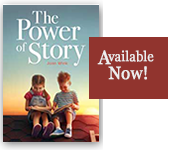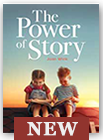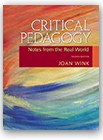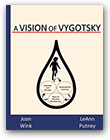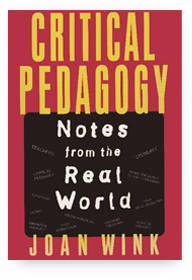An Open Letter to Future Teachers
Joan Wink
Dear Future Teachers,
I began teaching in 1966. I came from the rural Northern plains and started teaching in a high school on the Mainline of Philadelphia. This area was very upscale, very sophisticated, and very urban. It was everything I was not. This school believed in life-long learning. I had just finished a four-year degree program and thought I knew all there was to know. I was the only teacher without an advanced degree, and I knew that I would never, ever want one of those.
The school was new and huge. Every wall was made entirely of glass windows, floor to ceiling. I could stand in my room and see over the heads of students in many other classes. When the principal was coming down the hall, we knew well in advance, and I always watched for him. I can remember exactly what he looked like: he was impeccably dressed and very rigid-physically and philosophically. I remember thinking that one of his suits probably cost more than my entire wardrobe for teaching.
I would like to say that I was a day ahead of each class all year long, but the truth is that I was rarely more than 5 minutes ahead of each class. In 1966 when I began teaching, I thought I would teach a lot; I learned more.
I had come from a background of English and Spanish literature and grammar. In my first year of teaching I had to use the audio lingual method to teach four different levels of high school Spanish. We were to spend six hours a day speaking Spanish-repeating Spanish.
One problem: I didn’t speak Spanish. I could conjugate any verb in any tense; I could cite multiple poetic and literary allusions; I could put direct objects and indirect objects in the right place every time-as long as it was on paper. I just couldn’t speak, nor understand, Spanish very well.
My most vivid memory of my first year of teaching is a continual headache. I remember taking aspirin every day. Sunday nights were the worst time of the week. I swore I would never teach again. Before I finished my first year, I was able to articulate one concept, which had impressed me more than any others-teachers who teach in glass schools should not throw stones. In my first year of teaching, it seemed like everything I had learned in college didn’t fit, which is an experience I have had several times since.
Reflecting on this experience made me think about what I wish I had known before I started teaching that first year in Philadelphia. These reflections have led me to create a list of the top five things you should know before your first year of teaching.
The very first thing you will unfortunately learn in your first year of teaching is that we didn’t teach you everything in the credential program. It’s true: There will be a whole bunch of things that you won’t learn in the credential classes. When you first start to notice this, it will be very annoying. Some of you will even start to blame some of us. You might even be tempted to mutter: “If they had only told me about Program A, B, or C or Method D, E, or F.” When this begins to happen to you, please remember this: In your 10th year of teaching this will make you laugh. With any luck at all, and if you are receptive to new ideas, you will learn more in your first year of teaching than we ever taught you.
Second, you are going to have days when you come to class thrilled about your new lesson, and you will have worked hard preparing it. However, not long after you begin your lesson, you will notice that it is not as thrilling to the students as it was to you. In fact, it’s not even very exciting to you anymore. The lesson may even fall flat. This doesn’t mean you are a bad teacher. This doesn’t even mean it is not a good lesson. Do not panic. When this happens, and it will, I suggest you fix it, try it again, or just toss it. Above all, do not beat a dead horse. Better you grab a book and read a good story with the students.
Third, and some of you are not going to like learning this, but when you begin teaching, politics will be a part of it. How can it not be? Schools are filled with people, lots of people who each bring a diversity of thought, perspectives, opinions, and experiences. Schools are social, cultural, and political environments, which reflect the world around them. When you choose curriculum, it is a political act. When you make a decision about who will learn what and how, you are taking political action; and even if you choose not to act, your passivity is also a political action.
We live in a time when everyone is passionately interested in education. Are we on a historical path that leads us to a time when politicians and/or the public will choose goals, programs, curriculum, and methods? Are policy-makers in far away places mandating and controlling daily life in our neighborhood schools? What ever happened to the idea of local control? The polls demonstrate that the public has about had it with educators. The polls also demonstrate that the public perceives that the problem is with those schools in other places. However, people tend to like their own neighborhood school. This newly-acquired interest in education has made teachers an easy target.
The public blames teachers for low-test scores, for bad manners, for outrageous behavior, for violence, and for lack of morals. Teachers are blamed because the public and the politicians are frustrated and don’t know what to do. It is always easier to blame teachers and kids than it is to acknowledge the fact that schools are simply a reflection of the community. The blame game is easier than positive actions and interactions with teachers and students in the local schools.
Recently, in a far, far away place, an older gentleman stood up, shook his finger in my face, and said, “And, you people, over there at that university better get to work fast and fix schools.” This outburst came when I was invited to speak about education to a mostly-male civic group. My presentation had been well received, but during the question and answer period afterwards, it was clear that this man spoke from a majority perspective. I was definitely the minority -in multiple ways. After the club meeting ended, several sought me out to continue the barrage of teacher-bashing. I also noticed that four more of them shook their finger in my face as they talked to me.
When I fly on planes, it seems that anyone who sits next to me is an authority on education, because he or she has been to school. For years, when the stranger next to me asked what I did, I said proudly, “I am a teacher.” I have learned not to do this, as I get no peace during the flight. Now, when people ask me what I do, I have one of two answers. If I want privacy, I tell them I am a professor. Apparently, not many want to talk to a professor, and thus I happily get to read or write during the rest of the flight. However, if I feel like listening to someone, I tell them that I am a rancher’s wife. Everyone has nice things to say to a rancher’s wife. Yes, both statements are true. In addition, yes, I am still a teacher.
Teacher bashing must stop. The sudden interest in education and educational reform is having a deadly impact on educators who are now the scapegoats for all the social and economic ills of our society. The result is that education is held hostage; administrators are held hostage; teachers are held hostage; students are held hostage; learning is held hostage. Indeed, our very future is held hostage.
We are living through a time when the public suddenly cares about education and has an opinion about what should be done, how it should be done, and when it should be done. Some aspects of this process are good and right. For example, I welcome it when local communities begin to take control of their schools. I love to see families, teachers, and administrators working together to decide what is best for the kids in their own community. However, at the same time some aspects of this movement are bad and wrong. For example, I feel there may be some hidden contradictions in the perception that the public or popular vote is just good democracy at work.
Who is the public? Well, they are your neighbors, and they are mine. Okay, I’ll be honest: I am not sure we want some of them controlling curriculum in schools. Each person reading this page knows more about education than some of our neighbors, even though they may be delightful. We, as professionals, have valuable insights and complex understandings, which need to inform the process of education. What would other professionals think if suddenly the popular vote became a way of dictating their professional work?
The bottom line is that politics is a part of schools. I was never taught this in my preparation to be a teacher. You can imagine my surprise. In fact, I was taught to believe the opposite. I was taught that somehow we, teachers, were above politics, or that we worked on some pure plain of pedagogy. Turns out-it is not true. My advice on this is: Do not to deny it and do not be frightened by it. Jump in and share your knowledge, perspectives, and experiences. Who knows what the future holds for each of you and what role you will be playing in the future? I am sure we all can agree that we need good moral leaders-and, particularly good educational moral leaders. One of those future leaders may very well be you.
All in all, it seems that credential candidates want to know how-to, how-to, how-to; and university professors keep asking credential students to ask why, why, why. The public doesn’t care about how-to nor why, they only want to know: what happened? What did the students learn? What can students do? We come from an educational tradition that focused on methods and how to teach. That focus has shifted. Now, the national focus is on how students learn, and I think this is a very positive direction for our future.
Fourth, and I want you to remember that you learned it here first: There are going to be obstacles: again, and again, and again. When this happens, and it will, please remember that this is natural. Please do not be shocked and slip into cynicism, as it is a luxury we can’t afford-it hurts the students and you. In addition, it is a terrible waste of time, and it is no fun. Just remember:
- Albert Einstein didn’t speak until he was four, and he didn’t read until he was seven. His teacher described him as “Mentally slow, unsociable, and adrift forever in his foolish dreams.”
- Fred Astaire’s first screen test in 1933 said: “Can’t dance. Slightly bald.”
- Henry Ford went broke five times before his car ideas took off.
- Finally, the author, Richard Hooker, who wrote the novel M*A*S*H,* was rejected by 21 publishers before his book was accepted. It then became a runaway bestseller, a blockbuster movie, and a successful television series.
Yes, you will meet obstacles.
Fifth and finally, human relationships are at the heart of all we do in our classes. These human connections and interactions, which we establish with students, are our most important work-and, no state mandate, no politician, and no one in the airplane seat beside you can take that away from you.
Dear Credential Students, you, and only you, have the power to establish the most positive human connections in your classes so that students have the courage to grow into their full potential. I wish each of you the very best. Be patient-with the students, with us, and mostly with yourselves. The trick of great teaching is to last with passion for your own learning and a love of the people surrounding you. At the end of my first year of teaching, which was 38 years ago, I remember saying that I would never teach again, and I have been teaching and learning since that time. My work is not done.
Love,
Joan
(This is adapted from a speech given to CSU Stanislaus credential candidates in May, 1998. In addition, an earlier version of this was published in Wink, J., & Wink, D. (2004). Teaching passionately: What’s love got to do with it? Boston: Allyn & Bacon.)
